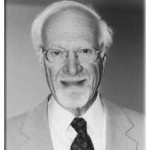One of the great pleasures of working at a foundation is to be able to meet and support great leaders who make lives better for others. One such leader in geriatric medicine is David H. Solomon, MD. An illustrious educator and scientist, Dr. Solomon has earned so many awards and honors that now others are honored in his name. Each year now the American Geriatrics Society bestows the David H. Solomon Award for physician leaders. At his home institution, where he served as chair of medicine, there is an endowed chair named for him, the Albert F. Parlow and David H. Solomon Chair for UCLA Program on Aging.
However, I know David best for the leadership he has provided over many years for the Foundation-funded Geriatrics-for-Specialists Initiative. The Foundation has come to believe, educated by David and many others, that all physicians need to be knowledgeable about the special considerations in caring for their older patients. In fields that participate in the surgical care of older adults, stretching from emergency medicine at the front of the hospital, to anesthesia, to rehabilitation at the other end, there is a particular need for internalized expertise. Older adults are major if not dominant users of many surgically related services and yet there is still limited appreciation for their special care needs pre and post operatively.
Just out this January is a paper in the Journal of the American Geriatrics Society based on remarks David made to the May 2009 annual meeting of the Section for Enhancing Geriatric Understanding and Expertise among Surgical and Medical Specialists (SEGUE), as it is now called, entitled Introduction to the Geriatrics-for-Specialists Initiative: Geriatrics Specialty Care at the Tipping Point. In his comments David reviews this 16 year old effort, including such milestones as the development of the Jahnigen career development awards for junior faculty in the specialties, the research agenda development process highlighting important gaps in essential geriatric knowledge, and most of all, the development of a sound and respectful partnership among the specialty disciplines and geriatrics.
I think his reflections upon his personal health concerns and their relation to these issues is particularly inspiring. Dr. Solomon is not only a teacher and researcher in geriatrics but he is also a "customer." He concludes,
I have a final plea. May these revolutions succeed, so when I have my second coronary bypass surgery, my emergency physician, my surgeon, my anesthesiologist, and my physiatrist will all understand the pitfalls that could await an old codger like me and will know the steps needed to prevent or manage the potential postoperative complications.

